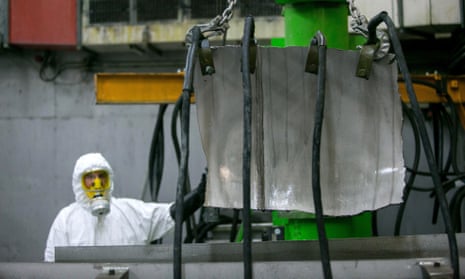Europe is facing a €253bn bill for nuclear waste management and plant decommissioning which outstrips available funds by €120bn, according to a major stock-take of the industry by the European commission.
The sum breaks down into €123bn for the decommissioning of old reactors and €130bn for the management of spent fuel, radioactive waste and deep geological disposal processes.
Of the EU’s 16 nuclear nations, only the UK had enough money ring-fenced to cover the coming financial crunch, according to the Nuclear Illustrative Programme of the Commission (Pinc), which covers trends to 2050.
Greenpeace EU’s energy policy adviser Tara Connolly said: “The €120bn figure is a whopping shortfall but it’s not surprising given that there is still no workable solution for the nuclear waste problem. With the huge resources needed to keep nuclear power alive, Europe could make a lot of progress towards a 100% renewable energy system instead.”
Some 90% of the continent’s nuclear plants are set to shut by 2050 – almost half within the next decade – and the paper sets out a daunting picture of the scale of the challenge facing nuclear power: up to €500bn will be needed to meet the cost of new plant builds and lifetime extensions, it says.
By 2050, a 47% increase in the cost of additional capacity is foreseen, combined with a 20% reduction in nuclear’s contribution to Europe’s electricity mix.
Mark Lynas, a pro-nuclear environmental campaigner said: “If that is the case, the EU will not meet its CO2 targets. It is simply not possible for the continent of Europe to run modern lifestyles in cities and industry using renewables. It really is a straightforward choice: either get over this anti-nuclear paranoia or throw the climate targets out of the window.”
The EU’s climate commissioner Miguel Arias Canete struck an upbeat note, arguing that the report showed that Europe had “learned the lessons” from the Fukushima disaster, with its first ever examination of the costs of the whole nuclear lifecycle, based on data provided by EU states.
He said: “Together, we should be able to identify ways to cooperate across Europe to ensure that knowledge about the safest use of nuclear power plants is shared, rather than done separately by each regulator, and that the management of radioactive waste is secured financially by member states until its final disposal.”
Under EU conventions, national governments are ultimately responsible for the disposal of spent fuel and radioactive waste management.
But the Green party reacted angrily to what they saw as an EU exemption of private operators from bearing clean-up costs.
The Green MEP Claude Turmes said: “It is the nuclear operators who are liable to pay for the waste, not the taxpayer, so how can Canete put out a statement like this, openly flouting the ‘polluter pays’ principle?”
More broadly, anti-nuclear groups criticised what Turmes called a “deliberate manipulation downwards of costs” by EU governments.
At present, nuclear reactors make up 27% of Europe’s energy capacity and produce less carbon over their lifetime than fossil fuels such as gas, coal or oil. But no solution has yet been found for the long-term storage of radioactive waste.
The commission’s experts considered closed fuel recycling of plutonium and uranium in ‘fast breeder reactors’ so long-term and uncertain a prospect that they did not forecast possible scenarios for its becoming available this century.
That leaves Europe with an increasingly haggard fleet of large scale reactors, whose average age is over 30 years.
Mini-reactors have been touted as one potential alternative, securing £250m of funding from George Osborne as an innovative nuclear technology. The report paints a mixed picture of their prospects, welcoming their potential but noting that they will have higher relative unit costs, lower economies of scale and burdens from licensing requirements.

Comments (…)
Sign in or create your Guardian account to join the discussion